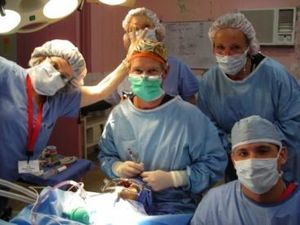Regional Engagement

Commander Lisa personally wheeled me down from Walter Reed’s Ward 5C to the post-op recovery room as part of the final insertion into The Process. It was an honor. The silver band with the sanscrit inscription had been bent off my wrist for the first time since it went on in Delhi a decade ago.
The piercings had been vacated for the first time ever. I was metal-free except for the fillings and caps on my teeth, and there was nothing I could do about that (I hoped) any more than I could about the tattoo on my arm- but there was enough ink on the arms and peeks at the flash of staff torsos that it did not appear to be an insurmountable problem.
I was passed off from post-op to pre-op by two competent Corpsmen and wheeled up one corridor and down another. We entered a space marked “Post Operative Recovery,” or something like that. Traveling on my bed was a disorienting process- the words and titles of the things I saw from the horizontal position were mysterious.
Apparently, anesthesia is not as straightforward as it used to be. Nurse Lisa explained it to me this way: “So, they are going to do two things. First, they will plant two drains in your leg, then target the area of surgical intervention with a specific drug that will numb it for as little as twelve hours, and still provide access if the pain is substantial. They can even send you home with a little pump to give additional relief.”
“And then there is the General Anesthetic as Round Two?” I asked. She nodded down on me, after introducing me to the duty nurse in Post-Op. She was a brisk, efficient lady who gave me a sense of confidence, except that she explained I needed to be in “Regional,” and that I would be back here later.
“Hope to see you then,” I said, remembering the fine print on the acknowledgment-of-risk form that helpfully reminds you that while the chances are small, in any surgical adventure you might not wake up from dreamland.
“Nope. I am almost off shift and I am a reservist,” she said. “I get to go back to Maine when this one is done.”
“What do you do Down East?” I asked.
She shrugged. “Surgical nurse,” she said. “But you have to serve, you know?”
I thanked her for her service as the two Corpsmen unlocked the wheels on my bed, and rolled me out into the corridor again.
We arrived at another double door that had letters that seemed to spell out “Regional Anesthetic Department.”
Other beds and their occupants were rolling in and out. I looked on with resignation. I was committed now, no escape, and the only way forward was through the veil of unconsciousness, hopefully on a temporary basis.
“It is going to be hot in here,” said a tall young man in green scrubs and matching surgical cap. He gestured toward a triage room where two Corpsmen wrestled the hospital bed into a space parallel with the window. It was hot- there was a standing fan next to me, but I was stripped down to only the inadequate coverage of the hospital gown, and did not mind that much.
The Team did, though, and turned on the fan. There was a no-nonsense African American lady who hooked up some electrodes to the contact points glued to my torso and upper arms from the EKG they ran on me back in the ward, a process that involved some frank talk about the goofy 0-6 with the wild tattoo and the piercings in bed 16B I overheard.
This was interesting. The Anesthesiologists are the comedians of surgery, the dispensers of the mind candy that enables us to bear the intrusion of alien hands within the confines of our earthly flesh. The first man to speak kept up a running tutorial, which I found fascinating. He had a name, as did the other two Docs who introduced themselves. I cannot retrieve them from the curtain that came down on me presently, but I was very much with them as they brought out the ultrasound gun and began to examine my upper thigh. I could see the screen from where I lay.
“What do you think you are looking at?” said Doc One.
“Looks like the femoral artery, if I had a guess,” I responded with interest. “I don’t know about the other structures.”
“Right you are,” he responded. “We are going into this thing here, the femoral sponge.”
“I had no idea I had one.”
Something that looked a lot like a catheter appeared in my peripheral vision and then appeared on the screen, accompanied by a tug in a place you normally are not lucky enough to get one. I asked about the flavors of candy they were going to give me, and that if possible I would prefer the twelve-hour version, rather than implantation of any appliance more complex. “I would like to get out of here as quickly as possible.”
Over his mask, Doc One crinkled his eyes and looked dubious. “Sure thing. Customer is always right,” and laughed.
“Do you want to stay with us as we do the regional?” he asked.
I thought for a moment and laughed myself. “If I am going, I may as well be gone,” I said. There was no counting back from a hundred or anything like that I recall. Instead, the world disappeared, just like that.
Copyright 2012 Vic Socotra
www.vicsocotra.com
